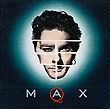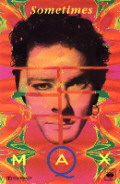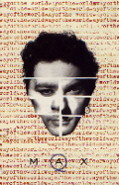 |
MAX QSOMETIMES | WAY OF THE WORLD | GHOST OF THE YEAR | EVERYTHING | CONCRETE | ZERO-2-0 | SOUL ENGINE |
||||
|---|---|---|---|---|
1989 would prove itself a very different year for Michael Hutchence, musically. He unzipped his rock star costume and went off and broadened his musical abilities to gain some credibility for himself. For a start he cut his hair. It came as a shock to many, used to seeing Hutchence use his hair like a cowboy throws a lasso, falling across his eyes, flipping back, drawing people of both sexes. "I felt like it, so I did it," he says. "I just got the old Swiss Army knife out. It's symbolic. I was getting sick of all these guys with permed, long hair. I didn't want to be associated with it, so I guess it was my statement towards that crap. If at the very least I got rid of some unwanted followers, those that were there for my hair. I had to grow up. It was the end of something in a way - the end of the INXS tour." Hutchence's haircut took place in a studio while he was making a record - not with INXS though, but with the experimental band Max Q . After more than a year touring the world in 1987-88, INXS were tired. They had been recording and performing over ten years, so they decided to cease being INXS for twelve months.
|
||||
Hutchence and Ollie Olsen first met in the movie Dogs in Space produced by Richard Lowenstein in 1986. Olsen was the musical director. His job was to re-create the post punk music of the late 70's in a way it would reach a wider audience. Their friendship was grounded when Michael sang Rooms For the Memory , a song Olsen had written twelve years before. The song reached the top ten in Australia. Max Q was a project named after Olsen's dog, a deaf insane Queensland blue heeler. The idea was Michael's, still energized from the INXS world tour and then on the ceremony circuit.
"Ollie had been writing songs his band won't play or can't so we recorded two. A few months later I was sitting around and I was really bored. I thought 'these songs sounded good, maybe we should do some more.' I rang Ollie and he flew up and we wrote the rest of the album in a week. Neither of us were great guitarists or keyboard players but I sort of learned the guitar while we were writing this, so it was a really fundamental way of writing, using a few little cassette players. You couldn't show off", says Hutchence. In a way they were using each other. Michael liked doing pretty adventurous things and Ollie liked to get Michael to sing the music that is too commercial for his own tastes. Much of the album was Olsen's work, part of a variety built up with different bands over the years like Young Charlatans , Hugo Clang and the Orchestra of Skin and Bone . "A lot of the lyrics are Ollie's", Michael explains. "We made those songs so different. For some of them Ollie would write the lyrics and I would write the music, or we'd write them together and throw ideas at each other. It was quite different to writing with INXS and I learnt a lot." When Hutchence and Olsen were writing the album, a lot of the lyrics and music was in conditioning with the state of the American culture at the time. Hutchence had a fascination with the US. Max Q , the music is very political and borders on the rebellious. It's subtle but it's there. Todd Terry who did the final mixes for the album is somewhere between the extremes of America. "He's a young man from Brooklyn, just a product of his neighbourhood," Hutchence explains. Way of the World, one of the singles released from the album is, says Hutchence, about "fear as a weapon, the conspiracy theory Ollie and I share". The lyrics are vaguely shaded as many he has written for INXS. 'Those who govern hold the gun to your head, with religions, corporations, proud of the blood they have shed.' Another song, Buckethead , is pure Olsen punk: ' Sometimes you feel like hell and your whole world is hell as well, sometimes you feel like all you can do is sleep. There's an eyeball on your shoulder and Lord, it's been there such a long time .' At the time of the final overdubs for the album, Michael was locked up in a Rhinoceros Studio and maintaining that if he didn't do this album there wouldn't be another INXS album. "What's the point in being successful when you can't do what you want," he said. He was on a learning curve as a musician. Despite the potential the album showed and the fact that it far surpassed anyone's expectations, Max Q was crushed under the weight of record company indifference. It gave Michael Hutchence a chance to learn and grow as a musician and Olsen the chance to come up from the underground and spread his wings. Michael Hutchence by the end of 1989 was a musician. A title he had worked hard for with years of work with INXS and the experimentation with Max Q . Then Hutchence (vocals, co-writing, co-production) made an album, billed as Max Q, with Olsen. Their joint approach gives Max Q a bit of a Midnight Oil feel, with more politics and a rougher rock sound than INXS. The use of synthesizers and strings keeps Max Q from being exactly earthy, but the record's got a certain energy and forthrightness that makes it an intriguing superstar aside. Ollie Olsen Ollie Olsen has been producing innovative music in Australia for the past twenty-five years. He began studying electronic music in the mid 70s under Felix Werder, a German composer living in Australia who had studied under Karlheinz Stockhausen. In the late 70's Ollie formed one of the first electronic bands, Whirlywirld, releasing a number of recordings on Missing Link Records. During the next ten years Ollie formed experimental outfits Hugo Klang and Orchestra of Skin and Bone, then the hard-core industrial techno band, NO. In the 1980s Ollie was invited to be the music producer for the movie "Dogs In Space". He provided much of the soundtrack himself, including writing the hit song Rooms For The Memory for INXS front man, and the movie's star, Michael Hutchence. After a brief collaboration with U2 on the single New York , New York by Echo Homo, Ollie was approached by Michael Hutchence to produce an album with him. The result was the successful and critically acclaimed MAX Q which spawned the hits Way Of the World and Sometimes. Ollie also worked at this time with legendary American producer Todd Terry and UK producer/DJ Paul Oakenfold. From the success of MAX Q came a major record company deal and Ollie formed the band Third Eye. The group made one critically acclaimed album of songs before Ollie decided to concentrate on instrumental electronic music. Thus Psy-Harmonics was born, with the Third Eye LP Ancient Future as the first release. Ollie's role as A&R for Psy-Harmonics has been instrumental in the unique vision and sound of the label. In Hard Rock cafe Sydney :
|
||||
![]()
home | news | biography | gallery | albums | lyrics | walk of fame | store | foundation | just a man | library | the fans | in his own words | support | links | communicate | contact


